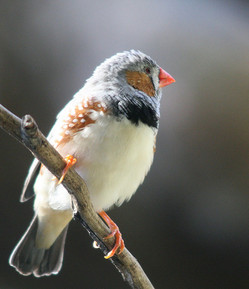 I’m an early riser, and I love the sound of the birds in the morning.
I’m an early riser, and I love the sound of the birds in the morning.
Recently, I learned about a research project that has made me think about songbirds from a whole different point of view.
I came upon this story in a very roundabout way–I got a call from a reporter in the region, looking for information about an IUP professor working with a local company.
Right church, wrong pew. He had the right professor, Paul Nealen, Biology Department, but not the correct information about the type of research. But, it put me onto a great story.
Dr. Nealen believes that the little zebra finch, a songbird native to Australia, may hold the key to understanding speech and hearing issues in humans.
For the past sixteen years, the last six at IUP, Dr. Nealen has been studying how hearing and vocal communication occurs in the zebra finch by examining how their neurons act during learning, memory, and communication.
Okay, just stay with me here.
It is his hope that, as researchers gain a greater understanding of how these neural circuits work in these songbirds, they will be able to determine how–and why–human speech and hearing problems like deafness and stuttering occur.
“We can learn things from birds that are really relevant for humans,” he said.
 Dr. Nealen says that songbirds learn to vocalize or sing in a way that matches how humans learn to speak–by hearing themselves practice. In humans, hearing our own speech helps us to produce normal speech. Just ask any parent about that–it’s what we do to help our babies learn to talk.
Dr. Nealen says that songbirds learn to vocalize or sing in a way that matches how humans learn to speak–by hearing themselves practice. In humans, hearing our own speech helps us to produce normal speech. Just ask any parent about that–it’s what we do to help our babies learn to talk.
Who knew that the same is true for zebra finch–hearing their own song helps them to maintain and refine their ability to sing?
The goal of Dr. Nealen’s research is to discover how individual neurons contribute to this overall function of using auditory feedback to guide the production of sounds.
One of the most exciting parts for me in telling the story to reporters is that Dr. Nealen involves IUP Biology undergraduate students in the project. But that’s another blog entry.
